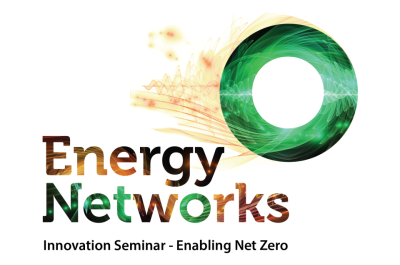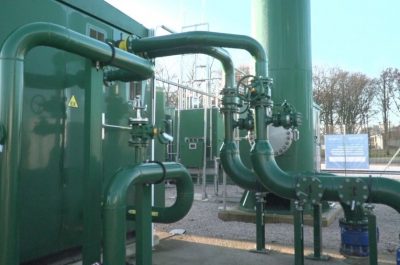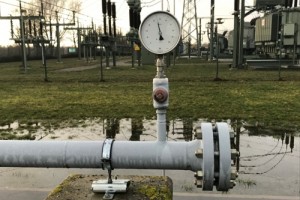Guaranteeing hydrogen some get up and GO
Most of us are familiar with the green and gold kangaroo or the Health Foundation tick. These quickly identifiable certification schemes are designed to give customers confidence in the product they are purchasing, with the assurance that the ‘’premium’’ products they buy are what they are purported to be.
Australia’s hydrogen guarantee of origin scheme would work in much the same way. The scheme is under development and will be an important tool in the policy toolbox to support the transition to renewable gas.
The Australian Government has been consulting on the design of a Guarantee of Origin (GO) scheme for hydrogen over the past two years. In the recent federal budget, it allocated $38.2 million over four years from 2023–24 (and $6.5 million per year ongoing) to establish the certification scheme. This would be designed to track and verify hydrogen emissions and other low-emissions products (based on hydrogen), and provide an enduring mechanism to certify renewable electricity.
The Commonwealth’s proposed GO Scheme[1] will be voluntary and established under new legislation administered by the Clean Energy Regulator (CER). It will start with coverage of hydrogen, hydrogen energy carriers and renewable electricity and is proposed to expand.
The GO Scheme includes two new certification types – renewable electricity GOs and product GOs.
Renewable electricity GO’s
A renewable electricity guarantee of origin (REGO) certificate mechanism would provide certainty for renewable electricity investment and procurement. The proposed REGO certificate would build on the Large-scale Generation Certificate (LGC) framework under the Renewable Energy Target (RET). The new mechanism would provide organisations with certainty about how renewable electricity would be recognised after 2030. This could support planning, contracting and investment decisions being made by businesses today. It would provide an enduring mechanism for the tracking, verification and trade of all renewable electricity generation in Australia.
Product GOs
Product GOs will verify the carbon intensity of products across their life cycle. The scheme aims to capture emissions associated with the supply of raw materials, production and transport and storage to the point of consumption or international departure – well-to-user. The product GOs may adopt a provenance approach where certificates could be traded alongside the product itself while having the flexibility to recognise that molecules may be interchangeable in certain situations.
The GO Scheme is designed to be a product-based emissions accounting framework that measures and tracks emissions and associated information across the value chain. The scheme would enable producers to make credible low emissions claims about their products, unlocking opportunities for trade, decarbonisation and investment. The proposed scheme has been developed in close collaboration with international energy partners to ensure it meets their needs as importers of Australia’s clean energy. The Government worked with the International Partnership on Hydrogen and Fuel Cells in the Economy[2] (IPHE). The IPHE is working with countries to determine the carbon emissions from hydrogen production.
The proposal is for a streamlined, upfront reporting model that minimises administrative burden for participation while maintaining accuracy and flexibility. The scheme is intended to be legislated by the start of 2024.
International hydrogen certification schemes
The International Renewable Energy Agency (IRENA) notes that the climate benefit of hydrogen depends on the emissions footprints of the method and energy source used to produce it and this footprint varies widely across pathways. Capturing sustainability criteria in a product certificate is necessary to establish low-carbon or renewable hydrogen as desirable commodities; for renewable hydrogen, certificates provide a marketable characteristic for hydrogen consumers looking for green products.
There are a range of hydrogen certification schemes (voluntary and involuntary) under development that aim to define low-carbon and renewable hydrogen. Their technical criteria vary in scope, emissions thresholds and accounting methodology – the same label might not refer to the same product with the same threshold in different schemes. Different schemes could also include additional environmental, social and governance criteria, which are not easily comparable with other schemes.
There is currently no hydrogen certification scheme suitable for international trade. Further work needs to be undertaken to develop a hydrogen certification scheme which encourages international trade. Many countries are currently working on hydrogen certification schemes, include Australia, Japan, China, European Union, United Kingdom, United States and the International Green Hydrogen Organisation. Table 1 shows their different voluntary schemes.
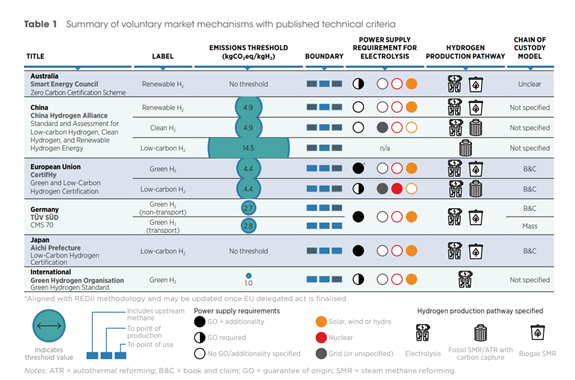
At least 60 countries have published or are drafting hydrogen strategies, with several aiming to establish themselves as hydrogen exporting regions. Most of the strategies include consideration of a certification scheme to quantify hydrogen-related emissions reduction.
The EU, United Kingdom and the United States are in the process of setting a definition of low-carbon and green hydrogen by specifying emissions thresholds and scope (Table 2).
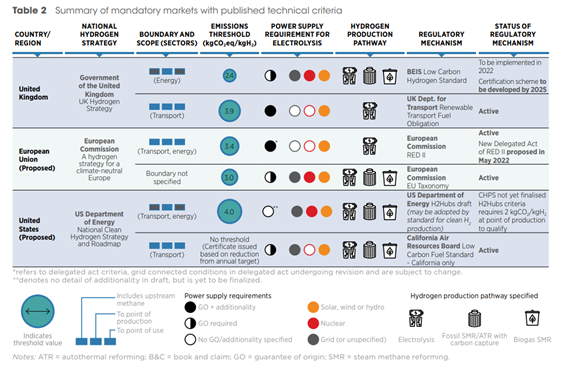
A patchwork of regulation would impede scaling of renewable hydrogen and have negative impacts on the international trade of hydrogen and its derivatives. If there is no effort to consolidate and harmonise the technical criteria used to classify hydrogen as low-carbon, there may be formation of markets equal to the number of certification rules in place which would be far from optimal.
Australia’s toolbox for renewable gas is growing. The continuing support for the Hydrogen Guarantee of Origin is an important tool that will provide customers with assurances that they are getting a low carbon, or a renewable, gas.
[1] https://www.cleanenergyregulator.gov.au/Infohub/Markets/guarantee-of-origin
[2] https://www.iphe.net/
[3] Creating a global hydrogen market: Certification to enable trade (irena.org)
